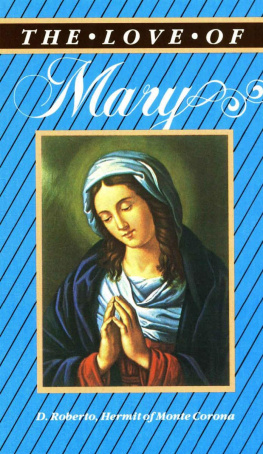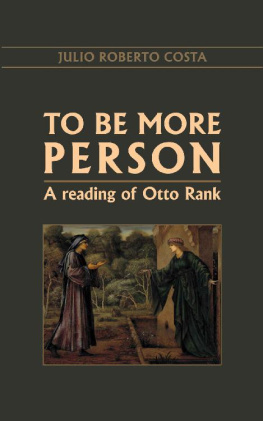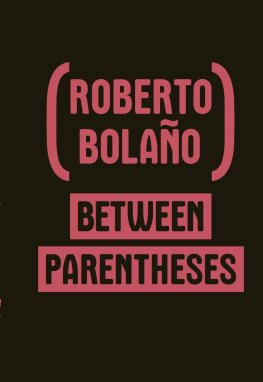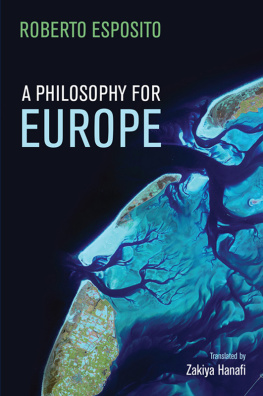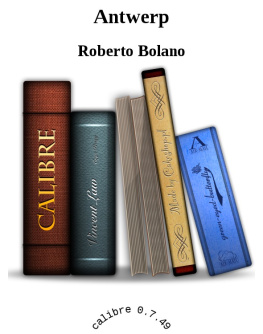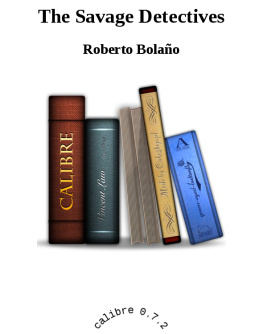D. Roberto - The Love of Mary
Here you can read online D. Roberto - The Love of Mary full text of the book (entire story) in english for free. Download pdf and epub, get meaning, cover and reviews about this ebook. year: 2015, publisher: TAN Books, genre: Science. Description of the work, (preface) as well as reviews are available. Best literature library LitArk.com created for fans of good reading and offers a wide selection of genres:
Romance novel
Science fiction
Adventure
Detective
Science
History
Home and family
Prose
Art
Politics
Computer
Non-fiction
Religion
Business
Children
Humor
Choose a favorite category and find really read worthwhile books. Enjoy immersion in the world of imagination, feel the emotions of the characters or learn something new for yourself, make an fascinating discovery.
The Love of Mary: summary, description and annotation
We offer to read an annotation, description, summary or preface (depends on what the author of the book "The Love of Mary" wrote himself). If you haven't found the necessary information about the book — write in the comments, we will try to find it.
The Love of Mary — read online for free the complete book (whole text) full work
Below is the text of the book, divided by pages. System saving the place of the last page read, allows you to conveniently read the book "The Love of Mary" online for free, without having to search again every time where you left off. Put a bookmark, and you can go to the page where you finished reading at any time.
Font size:
Interval:
Bookmark:
The Love of Mary
Readings for the Month of May
D. Roberto
Approved by the Most Rev. Archbishop of New York, 1856.
First published in 1856 by Edward Dunigan & Brother, Catholic Publishing House, New York, NY.
Reset and published in 1984 by TAN Books and Publishers, Inc. Typography is the property of TAN Books and Publishers, Inc., and may not be reproduced, in whole or in part, without written permission from the publisher.
Library of Congress Catalog Card No.: 83-51545
ISBN: 0-89555-243-4
TAN Books
Charlotte, North Carolina
www.TANBooks.com
1984
Translator's Preface
Dear Reader: It is with the greatest pleasure that I see this little book about to be circulated through the country. I have long desired to see it translated; and at last, concluded that if I wanted it done, I must do it myself.
The worldly-wise may mock at our devotion to the Mother of God, talk of "Mariolatry," and call us idolaters; but you and I know that what is folly in their eyes, is heavenly wisdom. We are not ashamed to honor her whom God honored, to love her whom our Blessed Redeemer loved, nor to call ourselves children of her who was the Mother of Jesus Christ. If they see this little book, they may throw it aside; yet those whom the world calls ignorant, but God calls wise, will read it, and meditate on the truths it contains. They will find in it consolation and pleasure, and will learn from it to love Mary.
It is addressed to Parthenius, a word of Greek origin, which means one who belongs to the Virgin, and is divided into 31 discourses, or chapters, one of which may be read each day during May, the "Month of Mary."
The good Roberto, who wrote this book, is now in Heaven, and has no need of your prayers; but do not, I pray you, neglect to say at least one "Hail Mary" for the translator.
Publisher's Preface
De Maria numquam satis "Concerning Mary there is never enough!" This ancient saying of the Church is marvellously brought out in this book, The Love of Mary . We can never overestimate the greatness, power, beauty, and sanctity of Mary, the Mother of God.
Where did she get her greatness, her power, her beauty, and her holiness? These are all gifts from God to her; they accompanied her glorious vocation to be the Mother of God and the Mother of the children of God.
Though Mary would be nothing without God, her Creator and Savior (who saved her so completely that He preserved her from all stain of sin), through God's almighty power she has been exalted above all the angels and saints. In his book entitled True Devotion to Mary St. Louis De Montfort explains with great clarity:
I avow, with the whole Church, that Mary, being a mere creature that has come from the hands of the Most High, is in comparison with His Infinite Majesty less than an atom; or rather, she is nothing at all, because only He is "He who is." Consequently, that grand Lord, always independent and sufficient to Himself, never had, and has not now, any absolute need of the Holy Virgin for the accomplishment of His will and for the manifestation of His glory. He has but to will in order to do everything.Nevertheless, I say that, things being as they are now, that is, God having willed to commence and to complete His greatest works by the Most Holy Virgin ever since He created her, we may well think He will not change His conduct in the eternal ages; for He is God, and He changes not, either in His sentiments or in His conduct.Thus we can understand the words of the hermit author of this book, D. Roberto, regarding God's dependence upon Mary, His submission and obedience to her, and His veneration of her. God willed to glorify His Name and accomplish His will in the world through Mary. Unlike earthly kings, God in His infinite Majesty is so great that He does not fear to share His greatness with a creature. No matter how many gifts God gives to any creature, He Himself always remains infinitely greater.
Sometimes the idea arises that our worship of God should be "pure" in the sense that we should "go directly to God," without becoming "sidetracked" by any creature. But to go to God through Mary is not to be sidetracked; it is to arrive at our destination sooner . If you will, Mary is the detour which brings us to our destination even sooner than if we had attempted to go "directly to God" on our own. Pope Paul VI asked:
Could anyone ever think that Marian devotion separates him from the unique and supreme devotion that we give to Christ, and through Christ, in the Holy Spirit, to God our Father? Could he ever say that this devotion is superfluous, when in fact it is a reflection of the divine plan for the Mother of Christ?... We are convinced without any doubt that devotion to Our Lady is essentially joined with devotion to Christ, that it assures a firmness of conviction to faith in Him and in His Church which, without devotion to Mary, would be impoverished and compromised.God Himself willed to depend upon Mary when He became man. He shut Himself up in her womb, taking His nourishment from her body. Our Lord also willed to perform His first miracle of grace, the sanctification of St. John the Baptist in St. Elizabeth's womb, at the word of Mary. And He performed His first public miracle at the request of His Motherthe changing of water into wine at the Marriage Feast of Cana. Furthermore, God has willed that all His graces should pass through Mary's hands. Yet God remains the Master of creation and grace. To quote St. Louis De Montfort again:
We must take great pains not to conceive this dependence as any abasement or imperfection in Jesus Christ. For Mary is infinitely below her Son, who is God, and therefore she does not command Him as a mother here below would command her child, who is below her. Mary, being altogether transformed into God by grace and by the glory which transforms all the saints into Him, asks nothing, wishes nothing, does nothing contrary to the eternal and immutable will of God. When we read in the writings of Saints Bernard, Bernardine, Bonaventure and others that in Heaven and on earth everything, even God Himself, is subject to the Blessed Virgin, they mean that the authority which God has been well pleased to give her is so great that it seems as if she had the same power as God; and that her prayers and petitions are so powerful with God that they always pass for commandments with His Majesty, who never resists the prayer of His dear Mother, because she is always humble and conformed to His will.God is infinitely merciful. Yet sometimes we find it easier to approach a creature, and a mother. God loves to grant His mercy through His Mother. The Lord complained to Ezechiel that there was no one who opposed His anger: "I sought among them for a man that might set up a hedge, and stand in the gap before Me in favor of the land, that I might not destroy it; and I found none." ( Ezech . 22:30). If God desires that someone pray and offer love so that He might not be required in justice to strike, who can perform this task better than His own Mother? And "If Moses, by the force of his prayer, stayed the anger of God against the Israelites in a manner so powerful that the Most High and infinitely merciful Lord, being unable to resist him, told him to let Him alone that He might be angry with and punish that rebellious people, what must we not think, with much greater reason, of the prayer of the humble Mary, that worthy Mother of God, which is more powerful with His Majesty than the prayers and intercessions of all the angels and saints both in Heaven and on earth?" ( True Devotion ).
It is the will of God, then, that we should serve, honor, and love Mary with our whole soul, with our whole strength, and with all tenderness; the more we love her, the more we shall please God. The honor and praise we give to the Virgin Mary pass on to God, her Creator who raised her to such perfection and glory. The worship and honor shown by men to the Mother, through love of the Son, are received by the Son as belonging to Him, since they are offered to the Mother in regard of the Son, and because it is known with what incredible love He loves His Mother.
Next pageFont size:
Interval:
Bookmark:
Similar books «The Love of Mary»
Look at similar books to The Love of Mary. We have selected literature similar in name and meaning in the hope of providing readers with more options to find new, interesting, not yet read works.
Discussion, reviews of the book The Love of Mary and just readers' own opinions. Leave your comments, write what you think about the work, its meaning or the main characters. Specify what exactly you liked and what you didn't like, and why you think so.

